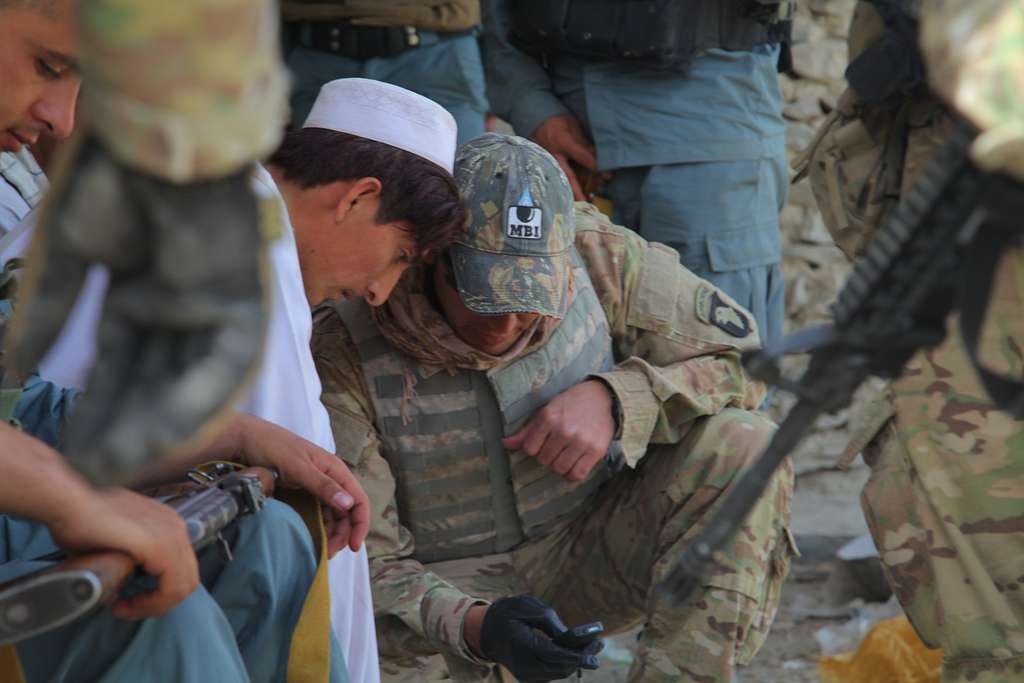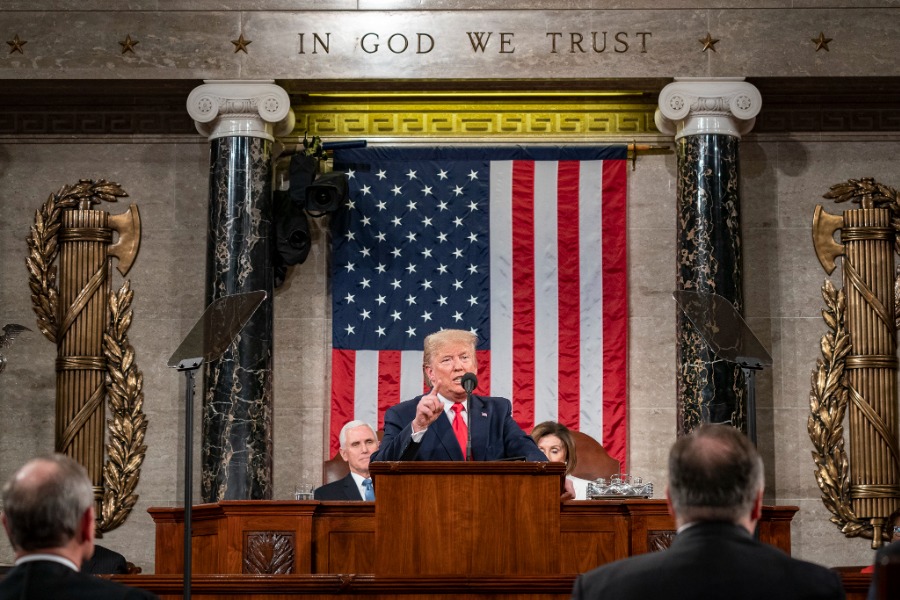Bill Barr on War Powers: Insights From his 2001 Oral History Interview
In the spring of 2001, Bill Barr, the former attorney general under George H.W. Bush who has now been tapped to resume that role under Donald Trump, sat for an oral history interview sponsored by the University of Virginia’s Miller Center.
Published by The Lawfare Institute
in Cooperation With

In the spring of 2001, Bill Barr, the former attorney general under George H.W. Bush who has now been tapped to resume that role under Donald Trump, sat for an oral history interview sponsored by the University of Virginia’s Miller Center. The transcript is fascinating reading on many issues, such as Barr’s explanation of his reluctant support for now-Justice Sonia Sotomayor for her original district court appointment, his argument for “massive retaliation against Libyan military intelligence targets” after the bombing of Pan Am Flight 103 was attributed to the Libyans and his belief that the “issue of the role of the Department of Justice versus the national security apparatus in terrorist situations … hasn’t been thought through.” But here I’d like to focus on his account of the clash between Congress and the president over war powers.
Barr’s narrative picks up at the time when President H.W. Bush already had deployed half a million troops to Saudi Arabia (Operation Desert Shield), but prior to the invasion to evict Iraq from occupied Kuwait (Operation Desert Storm). Barr had been head of the Office of Legal Counsel previously, and now was the deputy attorney general. With Attorney General Dick Thornburgh unavailable at a particular moment in time and given Barr's extensive experience with national security legal issues, Barr explained, he naturally became a key participant in discussions regarding whether the president should seek from Congress a formal authorization (or at least some form of endorsement) to use force against Iraq:
We knew the issue would eventually come, and the president would need some advice on the parameters of his power. First, I believed that the president did not require any authorization from Congress, and I believed that the president had constitutional authority to launch an attack against the Iraqis. … He didn’t put 500,000 troops over there for them to sit there, and there was no doubt in my mind that he was going to go on the offensive unless the Iraqis withdrew unilaterally. So I figured at some point I’d be asked my opinion on this. Then, before I knew it, I got this call that there was going to be a meeting over in the Cabinet Room to discuss the legal issues surrounding the operations in the Gulf.
…[W]hen I was leaving my office, Senator [William S.] Cohen was on the floor, a Republican purportedly, giving this speech saying that if any lawyer ever advised the president that he had the authority—because this was really being debated at the time, and there were op-ed pieces and so forth—if any lawyer told the president that he had authority to unilaterally attack the Iraqis, then that lawyer would be impeached. I was putting on my jacket listening to this going over to the meeting.
…The president said, Bill … I’ve been reading these articles. This op-ed piece the other day said I don’t have the authority to launch an attack on the Iraqis. What’s your view, what’s the Justice Department’s view on whether I have the authority? …
I said, Mr. President, there’s no doubt that you have the authority to launch an attack. I explained why I thought he did under the Constitution as commander-in-chief, and I gave him some different theories.
At this point in the narrative, things are relatively simple. Barr had made clear his view that the president’s inherent authority under Article II included the authority to initiate a large-scale, combined-arms operation involving massive ground forces, without need of congressional authorization in the form of an authorization for the use of military force or otherwise. But he also went on to express a back-up theory—one that he labeled a “bootstrap argument”—in the event that this first theory did not persuade. Here is Barr’s account of the bootstrap argument for presidential war powers:
…I gave him a secondary theory—which I was sort of proud of at the time, it was a bootstrap argument. I said, Now another reason here, Mr. President, is—even for the critics who would say that that wasn’t true—there’s no doubt that you have the authority to put 500,000 troops in the field. Congress authorized—through the approval of the U.N. whatever they are, resolutions, and through their authorization and all that stuff, Congress has definitely approved you putting 500,000 troops over there face-to-face with the Iraqi Army.
We have intelligence that they have weapons of mass destruction—chemical weapons, biological weapons—and your job as commander-in-chief is to make sure those troops are not preemptively attacked. If you feel as commander-in-chief that in order to protect your army in the field you have to launch first, you absolutely can do that. Which I thought was an ingenious argument, [redacted].
Let’s unpack that a bit. The argument proceeds in two steps. First, does the president have authority to deploy armed forces in non-combat capacities? Barr argued that Bush certainly had authority to go that far, and Barr reinforced that conclusion as to this particular instance by pointing out that there was little doubt Congress approved Operation Desert Shield. But this left open the question of whether it somehow followed that Bush also could order that deployed force, without congressional authorization, to initiate hostilities with Iraq. That brings us to the secondstep: By citing the risk that forces deployed in Saudi Arabia might be attacked preemptively by Iraq (by chemical or biological weapons no less), Barr concluded that Bush had available the option of initiating hostilities in the form of anticipatory or preemptive self-defense. Thus the bootstrap metaphor: The authority to attack the Iraqi military could be derived from the need to preemptively defend the deployed forces.
Notably, Barr paused at this point in his advice to the president in order to encourage him to obtain congressional support if possible, recognizing that this would put the president in the strongest position possible. But he also recognized that congressional debate on this subject would introduce the shadow of Justice Robert Jackson’s “tripartite framework” from Youngstown (Steel Seizure):
I said, However, Mr. President, even though you have the power to do this unilaterally, without any consultation with Congress or what have you, you certainly would be in a better position, the strongest possible position, if Congress did pass a resolution. It would not be the law. It wouldn’t be a statute authorizing you to do it, but a resolution supporting what you did.
The reason I say that is because on the Hill at that point they were actually talking about passing a resolution that said the opposite, that he could not use force unless he got their approval. There were some in the administration who were saying, Just let them do it, screw them, ignore them, and let them pass whatever they want.
I said, I think it’s better to get up there and engage, to get up there and see if we can head off that kind of resolution and, in fact, get a resolution in support of it.
President Bush, wisely, anticipated the potential Youngstown problem that might follow:
He said, Well, suppose they pass a resolution saying I cannot do it. What impact does that have?
Barr’s response was nuanced: "I said, It’s irrelevant. It’s not a statute. It’s just an expression of opinion. They can’t change the Constitution by expressing their opinion on the matter. I would say you could still do it.…"
This gets to a very important question, one that senators should explore during the confirmation hearings: Does Barr believe not only that the president has inherent authority to initiate large-scale hostilities (whether directly as in his primary argument above, or via a boostrapped-defense claim as in his fall-back argument), but also that the president can do so even when Congress purports to direct otherwise?
Critically, the answer Barr gave to Bush does not compel the conclusion that Barr believes the commander-in-chief can override a statute. He was careful to frame his answer to President Bush in terms of a hypothetical in which Congress is considering a mere concurrent resolution (that is, something passed by both houses but not presented to the president for signature and not of statutory nature). Barr seems to have been saying that a negative concurring resolution can indeed be overridden—that is, that the president in that type of lowest-ebb scenario would yet prevail on the war powers question. But it does not follow that Barr would take the same view if the congressional opposition took the form of an actual statute (including a proper joint resolution), particularly one leveraging the spending power. Indeed, it is quite possible Barr (like John Yoo) would accept the power of Congress to constrain the commander-in-chief at least via the spending power, so long as the congressional action managed to rise to the statutory level.
In the end, of course, these questions were moot as to what became Operation Desert Storm:
And [Dick] Cheney said, You’re giving him political advice, not legal advice. I said, No, I’m giving him both political and legal advice. They’re really sort of together when you get to this level. Then there was a debate as to whether he should get up on the Hill and push. I was saying he should, and Boyden Gray was saying he should. There were others who were opposed. Eventually he made the decision after that meeting that he would. The White House went full-bore on that vote and got the vote turned around, and then ultimately won the vote. That was an interesting experience. I enjoyed that.
I’ll close by noting what should be obvious from those who have followed these arguments over the past decade. The most common war powers dispute in recent years has been not the question of unilateral authority to engage in large-scale ground operations, but rather unilateral authority to engage in airstrike-focused operations that rely on allies for the ground component—giving rise to the notion, embodied by Obama’s 2011 Libya campaign, that the “war powers” debate is not actually even implicated in the first place in such cases. I think it’s safe to assume that Bill Barr would accept that reading of the president’s authority as well.




.jpg?sfvrsn=6cdd11de_5)
